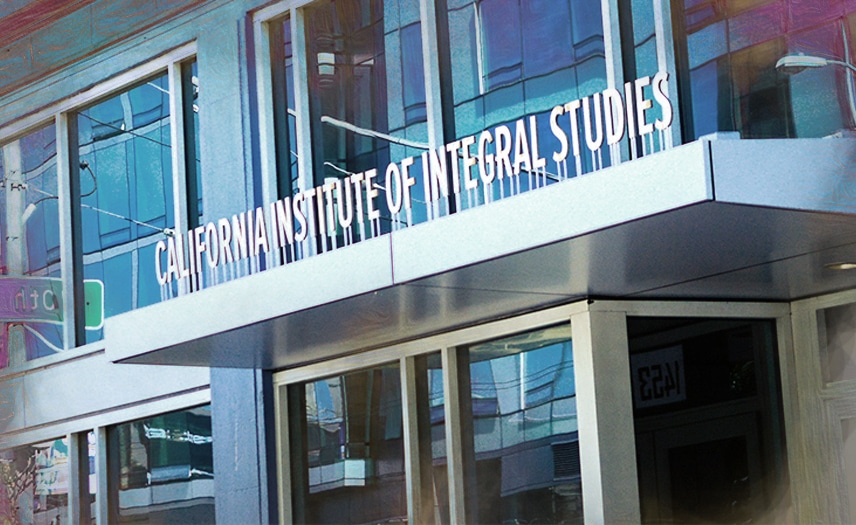If you have been following the field of psychedelic research, then you know that the last few years have seen some big strides forward for psychedelic therapy. You most likely heard the news that MDMA has been approved for Phase III PTSD trials (the final phase before potential legalization), but there’s been another major step forward in the field of psychedelic research that the mainstream news isn’t talking about as much—the California Institute of Integral Studies (CIIS) is piloting its first certificate program for Psychedelic-Assisted Therapies and Research (CPTR) to produce professionals specifically trained to work on psychedelic studies like the MDMA trials. On December 4th, 2016, the first class of students successfully graduated from the 8-month certification program, adding 41 highly educated members to the current field of psychedelic research.
This is the first program of its kind. It focuses on training highly qualified professionals in the field of psychedelic research and therapy, graduates who will likely go on to help design and facilitate critical psychedelic studies and to integrate psychedelic therapy into their current medical, psychiatric, and spiritual practices. They may also become future lecturers who will train therapists and researchers in appropriate therapeutic uses of psychedelics. This class is, in essence, the advance guard of the new face of psychedelic therapy as it becomes more widely understood and accepted.
An Overview of the Program
The Certificate in Psychedelic-Assisted Therapies and Research is offered by the Center for Psychedelic Therapies and Research, a branch of CIIS. It was designed by several top minds in the psychedelic research community and spearheaded by Janis Phelps, a 21-year professor at CIIS and the founder of the Center for Psychedelic Therapies and Research. Phelps pioneered the program because she recognized the need for thoroughly trained, accredited psychedelic therapists to support the growing research field of psychedelic therapy.
Although the program’s main focus is producing experts trained in psychedelic research and therapy, it has also integrated aspects of transpersonal psychology, consciousness studies, psychoanalysis, comparative mysticism, and anthropology into its 180-hour long program. The weekend workshops and residential retreats include both theoretical and applied training in the form of Holotropic Breathwork, role-play, and guided imagery. Participants did optional unique consciousness-expanding experiences such as solo wilderness trips, sweat lodges, and yoga intensives. This integrated approach to psychedelics and consciousness allows the graduates to experience non-ordinary states of consciousness first-hand and cultivate empathy for their patients. Although the certificate does not promote or require the use of psychedelics, Phelps did say that the Center is currently gearing up to apply to the FDA for approval for graduates of the program (as well as current Heffter and MAPS researchers) to undergo psychedelic sessions utilizing MDMA and psilocybin, if they wish.
Along with the hands-on learning offered, the graduates from this program were trained by the best of the best in the field of psychedelic research, and lecturers include researchers and professionals who have been working in the field of psychedelic research since its conception in the 1960’s. The program is also supported by notable organizations including the Heffter Research Institute, Multidisciplinary Association of Psychedelic Studies, the Council on Spiritual Practices, and the Usona Institute. By utilizing the top minds in psychedelic research, graduates received first-hand observations about the major pitfalls that have befallen psychedelic research in the past and how to avoid them in the future. This will help the new graduates design patient-focused studies that respect and support the participants while continuing to advance the field of psychedelic research.
A Look at the Graduates
This certificate program is aimed towards experienced professionals who will lead the way in the future of psychedelic research. As such, participants in the first class included only professionals who held advanced degrees, licensures, commissions or ordinations and who worked in the fields of counseling, psychotherapy, medicine, or spiritual advising. Participants in the certificate program had an average of 12 years of postgraduate professional experience in their fields and intend to make psychedelic research and therapy a subspecialty within their current practice. The graduates recognize that, with the current state of psychedelic research, it may be more than two to three years before they are able to begin putting their new skills to use, but they are prepared and excited to become an active part of the developing research in the United States.
Goals for the Future
The main goal of this program is to enable these graduates to be active leaders in current research projects like the Phase III trials and later clinical programs. These studies will include a large number of participants in a wide variety of locations and will, therefore, need more therapists trained to work with psychedelic substances. It is likely that some of the CIIS graduates will take on part of this work, and there are many other upcoming projects to which they could also lend their skills. Thorough training in psychedelic therapy allows these graduates to understand what study participants are going through and trains them to apply their knowledge in practical ways.
Depending on the results of the Phase III trials, MDMA could be approved for clinical use by 2021 and psilocybin by 2023. If this happens, MDMA will be more widely available, and there will be a greater demand for psychedelic therapists who can work with clients (not just MDMA) FDA approved substances. The current graduating class—as well as future classes—will likely help integrate psychedelic substances into modern psychology by offering expanded training throughout the country.
Finally, graduates of this program may choose to become integration coaches and work with individuals who have gone abroad to seek psychedelic therapy, or those who have had challenging experiences when taking psychedelic substances recreationally. Many people suffering from various mental and emotional disorders are unwilling or unable to wait for psychedelic therapy to be widely available, but well-trained professionals who recognize this can help ease the challenges for people who are currently struggling to integrate their experiences. This not only allows graduates to legally care for patients in the realm of psychedelic therapy but will also give the graduates greater insight into the various nuances of their patient’s psychedelic experiences.
Whatever the future holds for these graduates and the future classes of the certificate in Psychedelic-Assisted Therapies and Research, it promises to be exciting as the revival of psychedelic research and therapy continues. With increasing numbers of studies being allowed by the FDA and the impending legalization of psychedelic therapy, having a close cohort of experts who have been trained to approach psychedelics in a holistic, integrated manner will help create a community that holds researchers and therapists to high ethical standards. Ultimately, this groundbreaking program will allow the psychedelic research community to develop a deeper, more thorough understanding of the benefits, pitfalls, and possibilities of psychedelic therapy. The certificate program will be accepting applications for its third class later this fall. You can find out more about it and other programs offered by the Center for Psychedelic Therapies and Research on the CIIS website.












It was 40 years ago this week that I began my Ph.D. studies in Integral Counseling Psychology [Transpersonal Psychology] at what was then called the California Institute of Asian Studies, later renamed the California Institute of Integral Studies. There were about 150 students, with classes held in a private home on Dolores and 21st in Noe Valley, San Francisco.
Forty years later I’m impressed and delighted to see creative, innovative developments like psychedelic-assisted therapies and research taking place at one of the most avant-garde Psychology training programs in the country. This is clearly an emerging field that will change the face of psychological practice in the future.
As CIIS grows in its maturity and sophistication, I am honored and grateful to have been a doctoral student there from 1977-1986. I’ve always said that I was there in the adolescent years of the Institute – the school had been founded less than ten years earlier when I first arrived.
Being at that school allowed me to write a doctoral dissertation on Afterlife and postmortem survival in Judaism [“Judaism’s Contribution to the Psychology of Death and Dying”] which in turn led to the writing of JEWISH VIEWS OF THE AFTERLIFE, now seen as a classic in the field, and to be reissued in a third expanded edition in 2019.